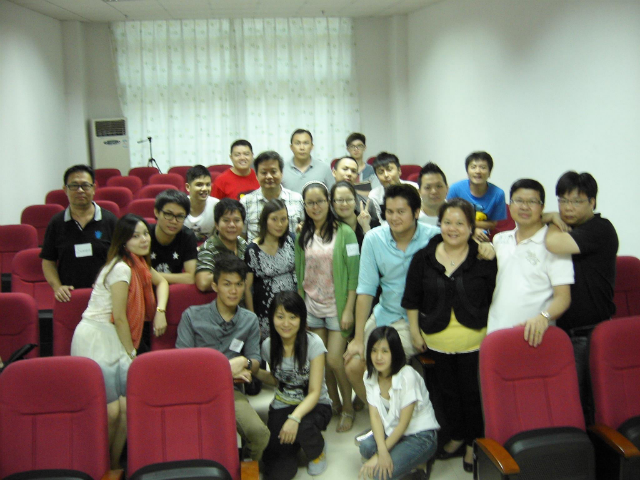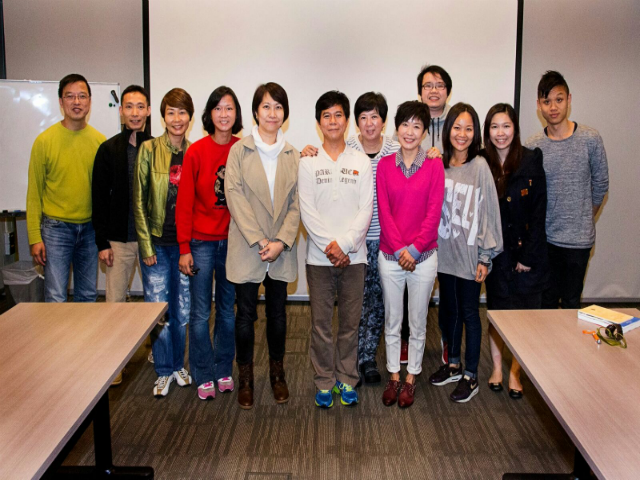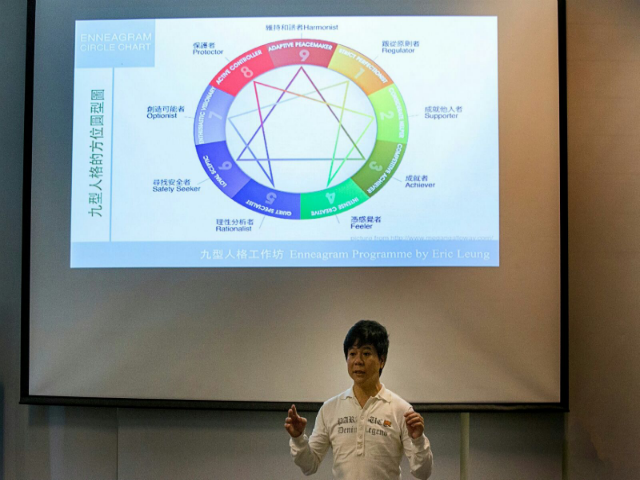Enneagram Psychology Certificate Course
Course Title: Enneagram Psychology Certificate Course
Course Code: EN 1018
What is the Enneagram?
The term Enneagram is derived from two Greek words: “Ennea,” meaning the number nine, and “Grammos,” meaning figure or diagram. The Enneagram is a symbol made up of nine points or positions, each representing a distinct personality type.
There are many different theories about the origin of the Enneagram. One belief is that it originated from the Sufi tradition of Islam and was passed down as ancient wisdom. It wasn’t until the early 20th century that spiritual teachers began introducing it to Europe and America.
The Enneagram is a system of personality typing that categorizes human personality into nine distinct types.



From Inner "Type" to Outer Truth – Discovering My Authentic Self
Enneagram Psychology is an ancient system of wisdom that explores the deep-rooted motivations of human nature, carrying strong philosophical significance. It specifically examines nine personality types, how these influence a person’s inner world, and how that manifests externally—often leading to various challenges in life. The core wisdom of Enneagram is not about observing external behavior but understanding the inner forces that drive those behaviors.
What Are the Benefits of Studying the Enneagram?
In simple terms, studying the Enneagram offers at least three major benefits:
-
Self-Awareness & Personal Growth
The Enneagram divides personality into nine distinct types. By understanding these types—along with their Basic Fears, Basic Desires, and Underlying Intentions—we uncover the truth behind our behaviors. This helps us reflect on ourselves more honestly and understand our traits deeply, allowing us to live more effortlessly and authentically. -
Improved Understanding of Others
Through learning the characteristics of the nine types, we begin to understand the diversity of personalities around us. Recognizing that others may view the world differently, have unique experiences, and are driven by different motivations helps us become more tolerant and compassionate, reducing judgment and conflict. -
Unlocking Potential
Knowing ourselves and others better allows us to identify the hidden potential within each personality type—such as the ability to love, empathize, and gain deep insight. These strengths support our growth, relationships, and emotional intelligence.
In summary, understanding our own and others’ personality types helps us collaborate more effectively, avoid unnecessary conflicts, and communicate with clarity. This is highly useful across business, education, training, family, and professional environments.
But Can Just Nine Types Truly Represent the Infinite Complexity of Human Nature?
In reality, the diversity and complexity of human personality can’t be fully captured by a set number of categories. The nine types simply provide a general framework.
Think of it like color: when someone says something is “red,” you immediately understand. It might be deep red, brick red, or pink—but it’s definitely not blue or yellow. Similarly, when someone says a person is Type Two, you understand they possess traits associated with Type Two—not Type Five or Nine. Of course, even within Type Two, there can be many variations!
There Are So Many Enneagram Courses Out There—Why Choose Life Enrich’s Enneagram Psychology Course?
Because our course is unique in ways you won’t find anywhere else!
Course Features
- Guided by the spirit of “Precision, Authenticity, and Efficiency,” this course helps participants grasp the essence of Enneagram wisdom and break through common misconceptions.
- Helps learners use the Enneagram to explore and uncover their personal truth.
- Enables participants to recognize their limitations and blind spots, and understand where these internal blocks originate from.
- Explores areas where the Enneagram alone may be insufficient in overcoming one’s weaknesses and blind spots—and offers practical solutions for real growth.
Enneagram Psychology Certificate Course Overview
- Explore the relationship between traditional Enneagram wisdom and self-discovery.
- Understand the key characteristics of each of the nine personality types and identify your suspected type.
- Guide learners to activate the energy of the Head, Heart, and Gut centers, and understand the differences between dominant, balanced, and withdrawn energies.
- Learn from the outside in – become aware of your conditioned responses shaped by past experiences.
- Learn from the inside out – recognize your true and innate ways of responding.
- Develop greater clarity and ease in identifying your own type.
- Improve your ability to recognize the types of others.
- Gain insight into wings and key considerations related to them.
- Understand the directions of stress and growth, and how to make behavioral choices accordingly.
- Deepen your understanding of all nine Enneagram types and personality patterns, enabling more accurate, well-rounded analysis and application.
- And much, much more...
Who Should Take This Course?
- Individuals seeking personal transformation and a deeper understanding of the Enneagram.
- Anyone who wishes to enhance self-awareness using the Enneagram.
- Those looking to develop deeper insight into others through the Enneagram.
- Professionals wanting to apply the Enneagram in business management and communication.
- Individuals hoping to improve interpersonal relationships.
- Those aiming to improve family dynamics.
- People looking to strengthen romantic relationships.
- Parents hoping to better understand and connect with their children.
Teaching Methods
- Instructor-led lectures
- Small group discussions
- Hands-on student exercises
- Case studies
Instructor Introduction
Eric Leung
- Personal coaching
- Corporate Training
- Personal counselling
- Family Coaching in relationship
- Soothing in emotions for personal issues / mentally sickness / depression
- Flower Therapy
- Meditation Training
Free Enneagram Psychology Certificate Course Makeup Classes & Retake Privileges – Rare in Hong Kong!
Learning Guarantee
To ensure the effectiveness of your learning, we offer an exceptional guarantee: Free makeup classes and retake privileges for the Enneagram Psychology Certificate Course, a rare offering in Hong Kong.
This allows students to fully complete the Life Enrich Training & Consulting Centre’s Enneagram course, even amid busy work and life schedules.
Additionally, students are welcome to return to retake the same course at different times and stages in their lives to gain deeper insights and new perspectives.
(Final decision rights are reserved by the Centre.)
Course Fee & Special Offers
Original Price: HK$2500 per person
- Current Discount Price: HK$1800 per person
- Special Offer (2 people enrolling together): HK$1700 per person
- Special Offer (3 people enrolling together): HK$1600 per person
Class Schedule & Venue
Enneagram Psychology Certificate Course Timetable
Course Code: EN-1018
Start Date: To Be Announced
Schedule: 2 sessions, held on Sundays, from 10:00 AM to 5:00 PM (12 total hours)
Venue
2021 Workshop Theme: “Enneagram & Emotional Management - Course Content
- Deep-rooted causes of emotional patterns in different Enneagram types
- The positive functions of emotions
- Misconceptions that lead to negative emotions
- Sharing experiences and mutual growth
2021 Workshop Theme: “Enneagram & Emotional Management - Target Audience
- Individuals who have already attended an Enneagram course and have a basic understanding of their own Enneagram type
Duration: 3-hour workshop
Date/Time: To be announced
Venue: Rm 1001, 10/F., Cheuk Nang Centre, 9 Hillwood Road, Tsim Sha Tsui, Kowloon, Hong Kong (Just a 5-minute walk from Jordan MTR Station, Exit D)
Course Fee
HK$300 per person
Instructor
Mr. Eric Leung
Registration and Payment Methods
You can make payments via the following methods:
- Bank Transfer or Deposit:
Please email your receipt to info@life-enrich.com (receipt can be a photo). Include your name, contact number, and course name.
- Bank: HSBC
- Account Name: Life Enrich Limited
- Account Number: 817-151889-838
- FPS (Faster Payment System):
- Use FPS to transfer to Life Enrich Limited.
- FPS number: 160989877
-
HSBC PayMe:
Contact us for details. - Cash Payment
-
Visa, MasterCard, JCB, Alipay, WeChat Pay, PayPal:
Contact us for details. -
Cheque:
Make payable to Life Enrich Limited. Include your name, contact number, and the completed registration form. Mail or submit to Room 1001, 10/F, Chuk Yuen Centre, 9 San Lam Road, Tsim Sha Tsui, Kowloon.
- Cheque Payable to: 「Life Enrich Limited」
Please download the course registration form and CEF application form (if applicable) from our website.
After completing the forms, please email them to: info@life-enrich.com, fax, or mail them to our center at:
Rm 1001, Cheuk Nang Ctr, 9 Hillwood Road, TST, Hong Kong
- A copy of your ID card
- Copies of your educational/work proof
- Completed and signed registration form
- Payment receipt
- CEF application form (if applicable)
The Hong Kong Government Continuing Education Fund (CEF) has increased the maximum subsidy per person to HK$25,000.
Students applying for a CEF account will receive assistance in applying for CEF funding upon course completion.
For inquiries, call 2332-8400!
Introduction to the Nine Personality Types
Type 1 – The Perfectionist
They are diligent, responsible, and always strive to do things well. They are self-critical and often criticize others. They set very high standards and have a strict sense of right and wrong, with an inner “should” and “should not” list. They dislike rule-breakers. They have a “delayed satisfaction” mindset and believe they should only relax once everything is stable and completed.
Type 2 – The Helper
The Helper is proactive, optimistic, and empathetic, always eager to help others. They are sensitive to the needs of others but often neglect their own needs. They find it hard to say “no” and may overextend themselves to satisfy others in order to fulfill their own needs.
Type 3 – The Achiever
The Achiever is energetic, adaptable, and highly focused on work and success. They seek recognition and approval from others and are motivated by achievement and external validation. They like being in the spotlight and are highly competitive, often changing their image based on the people around them.
Type 4 – The Romantic
The Romantic is unique, artistic, and emotionally sensitive, often feeling misunderstood. They are deeply emotional, with a rich imagination and creativity. They tend to focus on personal expression and have high empathy for others but may struggle to express their own feelings.
Type 5 – The Observer
The Observer is intellectually driven, analytical, and focused on understanding the world. They are independent, often valuing knowledge and personal space, and may struggle with emotional expression. They prefer logical analysis and enjoy engaging in research or intellectual pursuits.
Type 6 – The Loyalist
The Loyalist is cautious, dependable, and loyal. They are vigilant and tend to worry about potential threats, imagining worst-case scenarios. They seek security and stability and are often hesitant to act without support from others. They are hardworking, reliable, and make excellent employees.
Type 7 – The Epicure
The Epicure is enthusiastic, optimistic, and enjoys exploring multiple options. They fear monotony and are always seeking excitement and variety. They are lively and creative but may struggle with follow-through and tend to jump from one idea to the next.
Type 8 – The Challenge
The Challenger is strong-willed, assertive, and enjoys taking charge. They are confident, decisive, and embrace challenges, often viewing obstacles as opportunities to demonstrate strength. They are driven by justice and protecting others.
Type 9 – The Peacemaker
The Peacemaker is calm, easygoing, and values harmony. They avoid conflict and seek to create peaceful environments. They are empathetic and sensitive to others’ feelings but may struggle with asserting themselves and making changes.
Mental, Emotional, and Instinctive Wisdom
In Enneagram psychology, human wisdom is categorized into three types: mental wisdom, emotional wisdom, and instinctive wisdom, which correspond to different areas of the body: the head (mental center), heart (emotional center), and gut (instinctive center). Understanding these centers helps us identify different personality traits.
Head Center – Thinking Triad (Types 5, 6, 7)
Individuals with a head center are thinkers who make decisions after careful analysis and reasoning. They value knowledge and enjoy intellectual pursuits.
Heart Center – Feeling Triad (Types 2, 3, 4)
People with a heart center are emotionally attuned to others and value relationships. They are deeply sensitive to emotions and the feelings of others.
Gut Center or Body Center – Instinctive Triad (Types 8, 9, 1)
Individuals with a gut center are instinctive, often relying on their intuition and physical responses. They value autonomy, power, and self-assertion.
Wing Theory
Wings are the two adjacent types next to your main type. For example, a Type 2 may have a Wing 1 or Wing 3 (i.e., 2w1 or 2w3). According to this theory, each personality type can be further divided into 18 variations: 1w9, 1w2, 2w1, 2w3, 3w2, 3w4, 4w3, 4w5, 5w4, 5w6, 6w5, 6w7, 7w6, 7w8, 8w7, 8w9, 9w8, 9w1.
